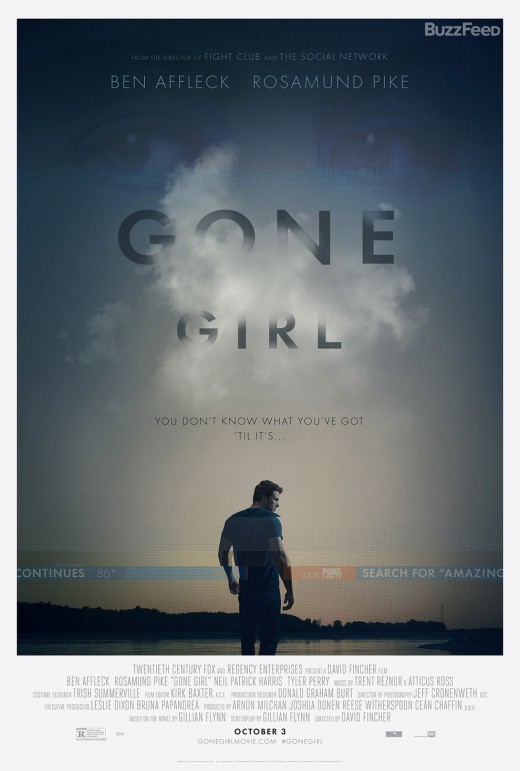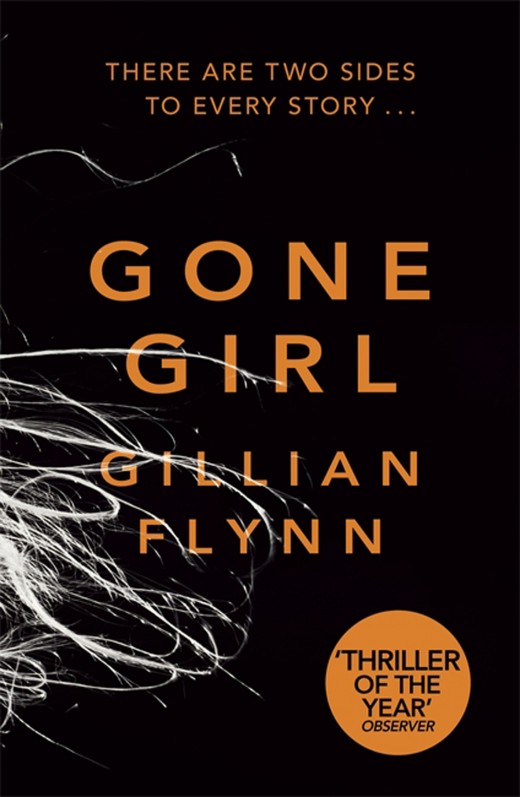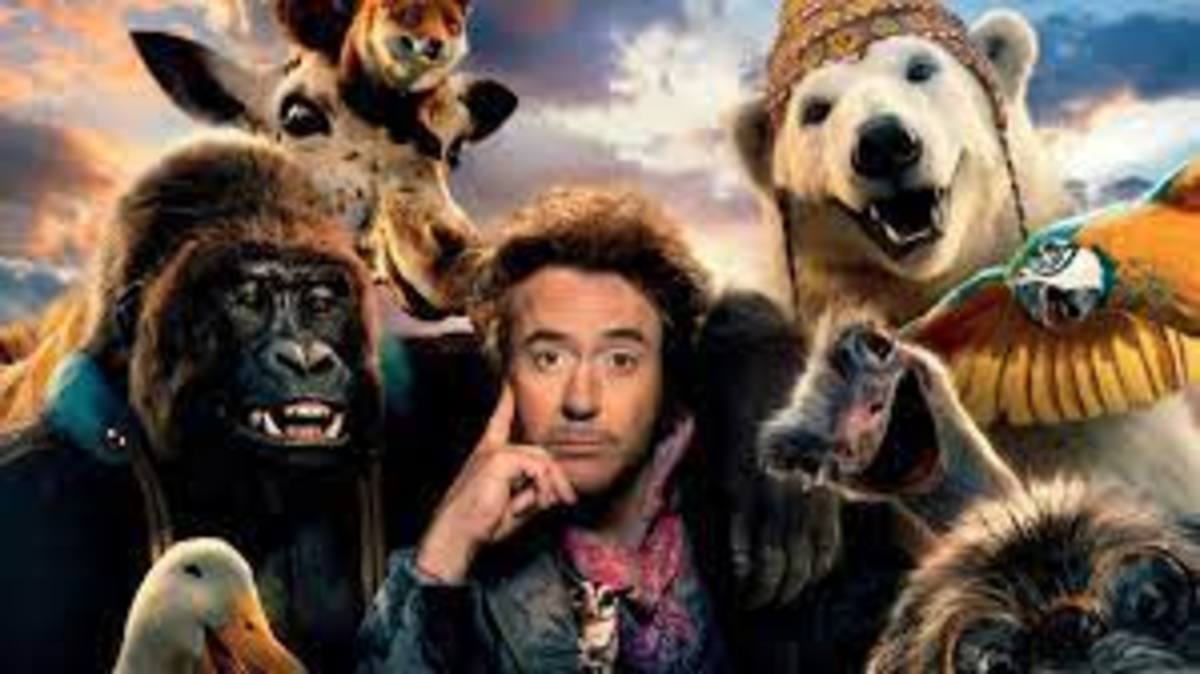Page to Screen: Gone Girl
Movie Poster for Gone Girl

The Film
In her first screenplay, Gillian Flynn also contributes to the cinematic adaptation of her book with David Fincher (known for films like The Curious Case of Benjamin Button, Se7en, and Fight Club).
The cast features Ben Affleck (perfectly) depicting Nick Dunne, Rosamund Pike as Amy Dunne, Neil Patrick Harris as Desi, Tyler Perry as Tanner Bolt, and so on and so forth.
It is a largely faithful adaptation, losing nothing of its previously established themes although some scenes are different, some characters are omitted, and a lot of inner thoughts go on unheard. A reader can recollect the thoughts from the book based on an actor's face during certain scenes, but a new audience member may miss out.
The Book
A 2012 thriller novel written by Gillian Flynn, Gone Girl sets up with a husband coming home to find his wife missing and what looks like a scene of struggle. After both the police and media becomes heavily involved in the search, things begin to look suspicious. What follows is an engrossing tale told from two perspectives, one of Nick Dunne who's the husband, and the other of Amy Dunne's diary. It's also a chilling depiction of a marriage going sour.New information is given out regularly and every bit changes the tone and previous facts of the story, prompting the reader to go back and re-read with a new perspective.
Book Cover for Gone Girl

The Adaptation
The film, with screenplay written by the author of the book, and directed by a man who's largely successful in book-to-movie adaptations, is believable good and faithful to its source material. While insignificant characters are omitted and small scenes are changed to be portrayed better in a cinematic setting, these do cause ripples that affect the rest of the plot.
Desi Collins
Likely the biggest change from the book to the film is how Desi Collins is portrayed. Played by Neil Patrick Harrison, Desi is shown to be quite a bit creepy, almost rape-y, and very possessive in his own way. In the book, his actions are motivated quite differently. A missing character from the film, Desi's mother, looks incredibly similar to an aged Amy and everyone seems to comment on this. In the novel, Desi is undeniably a momma's boy, doing what she says at all times and always looking to impress her. Furthermore, Desi imagines himself as a kind of knight in shining armor, put on this Earth in order to help and 'fix' broken women.
When encountering Amy finally in the film, he makes it his project to fix her up (in the book he goes so far to practically cut her food for her and spoon feed her) but he has an incredibly narrow view of what she should do. He never tells her she can't leave his lake house but informs her he has alarms on everything and that he'd rather her not know them. There is internet, but he doesn't give her the password to make sure she can't reach out and contact anyone. Desi wants her to himself, but never makes any kind of violent or aggressive move towards her, instead endlessly trying to woo her. Amy does manage to seduce him as she does in the film, only she ends up drugging him afterwards and kills him with a knife he had accidentally misplaced after feeding her food. His corpse takes the fall but his mother explodes in the media, but it lasts for a short while and amounts to nothing.
Bill Dunne
Nick's father had a drastically smaller role in the film, although this is understandable. Suffering from Alzheimer's, Amy takes advantage of his mental condition and continues to mockingly persuade him when no one's around, prompting him to come back to the house again and again during her disappearance before she left in order to create more of a media stir. Nick hates his father for numerous reasons, largely for his treatment of women, and fights against becoming like his father. In the end when he's succumbed to Amy's plan for their future, he steps away just short of killing her, promising himself that he'd be better than him.
Hilary Handy
A character in the book given a similar treatment to Thomas O'Hara. In middle school, Amy takes Hilary under her wing and persuades Hilary to change a lot of things about her before prompting her to make a joke about replacing Amy to Amy's mother. Amy then goes around and swears that Hilary is stalking her and acting as if she's going to hurt her in order to make Hilary pay for small, childish things, such as not remarking when Amy got a haircut or forgetting that Amy's allergic to strawberries. In the book it continues to show that Amy is truly psychologically screwed up as well as a mastermind manipulator.
The Antifreeze
The fallout between Nick and Amy after she returns is initially stopped when Amy reminds Nick that she gave reasonable evidence that he once tried to kill her through antifreeze poisoning. In fact, after Amy did it to herself, she kept evidence of it and promised to use it to make sure Nick was thrown back out to the wolves if he left her. Eventually Nick does find and throw away the box of broccoli with vomit in it from the freezer but Amy's machinations have caused him to try to outsmart her and publish...
Nick's Memoirs and 'Amy set me up.'
In the film, it would appear that Nick was going to rat out on Amy's plan on Abbott's show before Amy convinces him not to when she becomes pregnant using his frozen sperm. In the book, Nick writes a very large manuscript explaining everything, how she set up him and how she admitted to what she had done and her confession to have killed Desi.It's right when he's about to send it out to a publisher that she reveals she's pregnant, causing him to delete everything.
Furthermore after the woodshed had been discovered, Nick and Tanner Bolt presented the evidence that Amy was alive and framing Nick for killing her. However, the police have lost all faith in defending Nick and it's only afterwards that the main detective believes him but it's all too late.
Rand and Marybeth Elliot
Amy absolutely hates her parents. She feels that they used her as a tool, basing slightly more successful stories on her with the Amazing Amy stories and profiting off of her. In her own mind, Amy believes all their success is attributed to her but her parents treated her only as a cash cow.
The Ending/Last Chapter
While it definitely doesn't drastically change anything, its slightly ambiguous ending gives different impressions. At the beginning of the film, Nick muses violence to understand what his wife is thinking. The final scene is highly reminiscent of the first and Nick still ponders his wife's thoughts. However, it's the previous mention of violence that rests uncomfortably in the air, causing the audience to wonder if Nick will eventually kill her at some point.
In the book, it's from Amy's perspective and shows a very different Nick. It's just before the due date of their child and Nick is being sweet to his psychopathic wife. She asks him why he's so wonderful to her, expecting him to admit he loves her. Instead, he tells her he feels sorry for her because 'every morning you have to wake up and be you.' She admits this response haunts her and wishes she'd never heard him say it.
The book's ending instead depicts Nick as progressing past his anger, fear, and general distaste for his wife but instead of giving into her, he pities her, something that deeply offends and unnerves her. It's not a grand victory by any means but in a small way Nick has some kind of victory and it's nice to see that Amy doesn't get her way completely (not that Nick is infallible, only sympathizable in this instance).
Trailer for Gone Girl
Closing Thoughts
The book to film adaptation of this plot is very good for two significant reasons, that the plot was relatively unchanged and that all the themes were still there (the corrupted media, and the unfortunate realities of marriage although exaggerated to a high degree). All the characters were still the same characters and if a slightly different action in a scene occurred it still brought on the same effect. Characters were very well cast and played their parts believably (personally, I imagined Desi Collins as a bit of a pudgy, almost sympathetic or pitiable fellow). I find it to be one of the better adaptions, not necessarily improving upon its original work but reformatting itself for a different medium perfectly while remaining true to the original plot.
Book vs. Movie
For those of you who read the book and watched the movie, what did you prefer?
Further Reading
You can read more Page to Screen adaptation commentaries if you click here.
Also read one of David Fincher's older movie adaptations in Fight Club.





